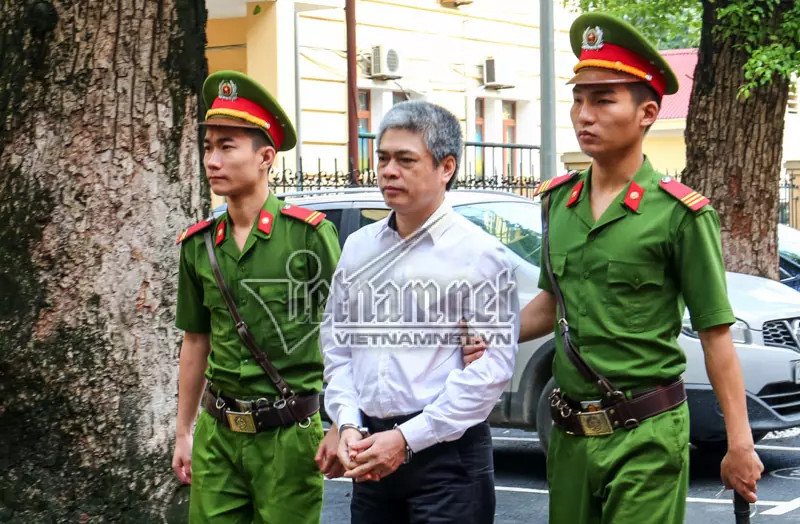
Public attention once focused on compensation for damages paid by Nguyen Xuan Son, former CEO of Oceanbank.
In 2017, Son was sentenced to death by the Hanoi People’s Court for his embezzlement of VND49 billion from PetroVietnam.
Under current laws, commutation from a sentence of death to life can occur if at least 75 percent of the assets that were embezzled are paid in compensatory damages. In this case, the amount was VND37 billion.
At the appeals court trial which took place in May 2018, the information about Son trying to collect money to remedy the consequences of his actions to escape the death penalty heated up the court.
A friend of Son, who was a businessman, was willing to spend VND32 billion to save Son from the death sentence. At that time, Son’s wife said she had paid VND5 billion. So Son had VND37 billion for compensation.
Son said that he hoped the court would recognize his efforts to remedy consequences and reduce the sentence to life. The chair of the hearing said the jury council had to consider the case thoroughly.
The jury at the appeals trial said the defendant had many assets but they had been distrained, and that the defendant truly wanted to remedy consequences.
Therefore, the board proposed that the enforcement agency give guidance to Son’s family to compensate for the consequences of his actions. It also proposed that the chief judge of the Supreme People’s Court commute the death sentence to life imprisonment.
Asked why the jury of the appeals trial did not decide on commutation and asked the Supreme People’s Court to consider it, a deputy head of the court cited laws to explain this.
Clause C of Article 40 of the 2015 Penal Code on the death penalty says that individuals sentenced to death for embezzlement of property but who pay back at least 75 percent of the embezzled properties and cooperate with investigation agencies to redeem their guilt will not be sentenced to death. In this case, the Chief Justice of the Supreme People's Court can commute the death penalty to life imprisonment.
Duong Chi Dung, former chair of Vinalines, is another example. In 2014, he was sentenced to death by the appeals court for embezzling VND10 billion and was forced to pay VND110 billion.
At a press conference in 2017, the then Director of the Civil Judgment Execution Department of Hanoi Le Quang Tien said in addition to the amount of money that Duong Chi Dung's family had paid, the city's Judgment Execution Department had completed the handling of all the assets that the judgment had distrained. Dung’s assets, which had been distrained to secure the judgment execution, included half of the value of his house on Nguyen Hong street.
According to the judgment, Duong Chi Dung's property was distrained to secure the judgment execution including half of the value of the house on Nguyen Hong Street, which is the community property of Dung and his wife; a luxury apartment at Sky City Project at No 88 Nguyen Chi Thanh; and an apartment on Ly Thuong Kiet street.
Dung then received a life sentence because of his behavior to remedy consequences.
The most recent case is of Nguyen Duc Chung, former mayor of Hanoi. At the appeals court trial related to the procurement of Redoxy-3C which took place in June, Chung declared his innocence, denying his obligation to pay VND25 billion in compensation for damages as the first-instance court had said he should.
However, before the deliberation began, Chung suddenly changed his attitude and claimed his responsibility. Chung’s sister paid VND10 billion in compensation and his wife paid VND15 billion.
The Procuracy asked the court to consider commuting the sentence for Chung. The wise decision in the last minute helped Chung reduce the sentence from 8 years to 5 years in prison. The court also decided to cancel the distraint of Chung’s properties.
Nguyen Thang Loi, Deputy General Director of the General Department of Civil Judgment Enforcement, said that allowing corrupt criminals to remedy consequences to reduce criminal sentences is not a new regulation. This is applied in many countries. The Ministry of Justice is learning international practice and considering applying it in Vietnam.
T. Nhung